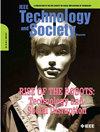Edge Computing and IoT Data Breaches: Security, Privacy, Trust, and Regulation
IF 1.9
4区 工程技术
Q3 ENGINEERING, ELECTRICAL & ELECTRONIC
引用次数: 0
Abstract
Edge computing is an emerging computing paradigm representing decentralized and distributed information technology architecture边缘计算和物联网数据泄露:安全、隐私、信任和监管
边缘计算是一种新兴的计算模式,代表着分散式和分布式信息技术架构[1]。对边缘计算的需求主要受智能设备和物联网(IoT)数量增加的驱动,这些设备和物联网会产生和传输大量数据,而这些数据原本会存储在云计算服务中。边缘架构使数据和计算能够在靠近用户和数据源的地方进行,并成为通往上游数据中心的途径[2]。分析和工作不是将数据发送到云端进行处理,而是在更靠近数据源的地方进行(图 1)。与云计算相比,边缘服务可利用本地基础设施资源,从而减少网络延迟、提高带宽利用率和能源效率。
本文章由计算机程序翻译,如有差异,请以英文原文为准。
求助全文
约1分钟内获得全文
求助全文
来源期刊

IEEE Technology and Society Magazine
工程技术-工程:电子与电气
CiteScore
3.00
自引率
13.60%
发文量
72
审稿时长
>12 weeks
期刊介绍:
IEEE Technology and Society Magazine invites feature articles (refereed), special articles, and commentaries on topics within the scope of the IEEE Society on Social Implications of Technology, in the broad areas of social implications of electrotechnology, history of electrotechnology, and engineering ethics.
 求助内容:
求助内容: 应助结果提醒方式:
应助结果提醒方式:


